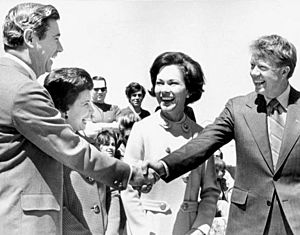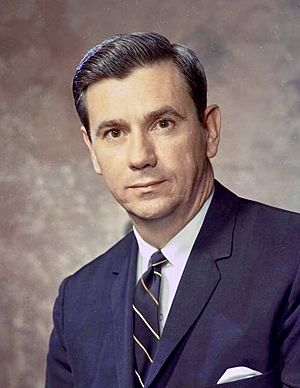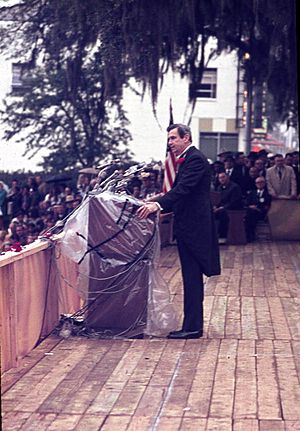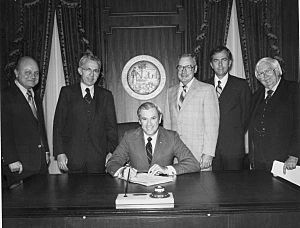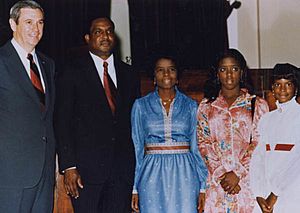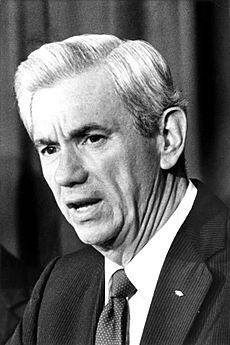Reubin Askew facts for kids
Quick facts for kids
Reubin Askew
|
|
|---|---|
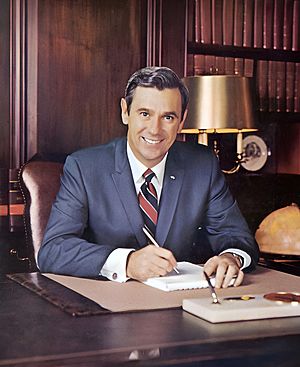 |
|
| 7th United States Trade Representative | |
| In office October 1, 1979 – December 31, 1980 |
|
| President | Jimmy Carter |
| Preceded by | Robert S. Strauss |
| Succeeded by | Bill Brock |
| Chair of the National Governors Association | |
| In office January 23, 1977 – September 9, 1977 |
|
| Preceded by | Cecil Andrus |
| Succeeded by | William Milliken |
| 37th Governor of Florida | |
| In office January 5, 1971 – January 2, 1979 |
|
| Lieutenant | Thomas Burton Adams Jr. Jim Williams |
| Preceded by | Claude R. Kirk Jr. |
| Succeeded by | Bob Graham |
| Member of the Florida Senate from the 2nd district |
|
| In office November 6, 1962 – November 3, 1970 |
|
| Preceded by | Philip D. Beall |
| Succeeded by | W. D. Childers |
| Member of the Florida House of Representatives from Escambia County |
|
| In office November 4, 1958 – November 6, 1962 |
|
| Preceded by | J. B. Hopkins |
| Succeeded by | Gordon W. Wells |
| Personal details | |
| Born |
Reubin O'Donovan Askew
September 11, 1928 Muskogee, Oklahoma, U.S. |
| Died | March 13, 2014 (aged 85) Tallahassee, Florida, U.S. |
| Political party | Democratic |
| Spouse |
Donna Lou Harper
(m. 1956) |
| Children | 2 |
| Education | Florida State University (BA) University of Florida (LLB) |
| Signature | |
| Military service | |
| Allegiance | |
| Branch/service | |
| Years of service | 1946–1948 |
| Rank | |
| Unit | Paratrooper |
Reubin O'Donovan Askew (September 11, 1928 – March 13, 2014) was an American politician. He served as the 37th governor of Florida from 1971 to 1979. Askew was a member of the Democratic Party. Later, he was the 7th U.S. Trade Representative from 1979 to 1980. He worked under President Jimmy Carter.
Askew was known for his work on tax reform and civil rights. He also promoted financial openness for public officials. He had a strong reputation for being honest.
Born in Muskogee, Oklahoma, Askew later moved to Pensacola, Florida. He became a lawyer after studying at the University of Florida Levin College of Law. He served in the United States Air Force during the Korean War. Askew was elected to the Florida House of Representatives in 1958. Then he joined the Florida Senate in 1962.
In 1970, he won the election for governor. He defeated the Republican governor Claude R. Kirk Jr.. Askew was re-elected in 1974. As governor, he introduced Florida's first corporate tax. He was also one of the first "New South" governors. These leaders supported school desegregation. Many people believe Askew was one of Florida's best governors.
After his time as governor, Askew served as the United States Trade Representative. He also ran for president in 1984 but later withdrew. After leaving public office, he taught at Florida's public universities.
Contents
Early Life and Career
Reubin O'Donovan Askew was born in Muskogee, Oklahoma. He was the youngest of six children. His parents were Leon G. Askew and Alberta (O'Donovan) Askew. His parents divorced when he was two years old.
In 1937, his mother moved with Reubin to Pensacola, Florida. Reubin's middle name, O'Donovan, was his mother's family name. He used the initials O'D. in his signature to honor her. Reubin worked hard to help his mother earn money. He sold magazines, shined shoes, and bagged groceries. He also sold his mother's homemade pies. His mother worked as a waitress and a seamstress.
Askew graduated from Pensacola High School in 1946. Later that year, he joined the Army as a paratrooper. He served for two years and left as a sergeant in 1948.
Next, Askew went to Florida State University. He was elected student body president there. This was the start of his long political career. He earned a degree in public administration in 1951. He then studied law at the University of Florida Levin College of Law.
During the Korean War, Askew served in the Air Force from 1951 to 1953. He was a military intelligence officer. After the war, he returned to Pensacola in 1955. He started a law firm there.
Askew married Donna Lou Harper in August 1956. They had two adopted children, a daughter and a son. They were known to have a very happy marriage.
Legislative Career
In 1956, Askew was elected Assistant County Solicitor for Escambia County, Florida. He was a Democrat. In 1958, he was elected to the Florida House of Representatives. He represented Escambia County.
After two terms in the House, Askew was elected to the Florida Senate in 1962. He represented the 2nd district, which included Escambia County. He was reelected several times.
From 1969 to 1970, he served as president pro tempore of the Senate. This meant he was a temporary leader of the Senate.
Askew was a progressive lawmaker. He supported changing how the state legislature was divided. This was to make sure that areas with more people had more representatives. Before, rural areas had more power than their population suggested.
Askew also opposed racial segregation. He worked against laws that prevented black voters from participating. The Voting Rights Act of 1965 helped African Americans vote again.
Governorship
Askew won the Democratic nomination for governor in 1970. Thomas Burton Adams Jr. was his running mate for lieutenant governor. The Miami Herald newspaper supported Askew. They said he offered "new leadership" for the state.
The Republican governor, Claude R. Kirk Jr., made fun of Askew during the campaign. But Askew and Adams won the election with 57% of the vote. They defeated Kirk and Lieutenant Governor Ray C. Osborne. Florida had only recently created the lieutenant governor position.
In 1974, Askew was re-elected with J. H. Williams as his running mate. He was one of only a few Florida governors to serve two terms. Askew was the first governor to serve two full four-year terms.
During his time as governor, Askew focused on tax reform. In 1971, he helped pass the state's first corporate income tax. This tax was on businesses. He also increased the homestead exemption. This helped homeowners pay less in property taxes.
Askew always pushed for openness in government. He tried three times to pass a law requiring public officials to share their financial information. When the legislature didn't pass it, he used a special rule. He collected enough signatures to put the idea on the ballot in 1976. Voters approved this "Sunshine Amendment" by a large margin (78%).
This amendment required public officials and candidates to share their finances. It also banned gifts to lawmakers. And it stopped former officials from lobbying for two years after leaving office.
Askew earned a reputation for being very honest. He was even called "Reubin the Good." This was especially true during a time when other government scandals were happening. One political opponent said he brought a "morality in office" that made people trust the government.
Askew also worked with other governors. He led the Education Commission of the States (1973–1974). He also chaired the Southern Governors' Conference (1974–1975). In 1977, he was chairman of the National Governors' Conference.
Civil Rights and the New South
Askew was one of the first "New South" governors. These were new leaders who supported civil rights. He was elected in the same year as governors like Jimmy Carter of Georgia. Askew supported school desegregation. He also supported busing, which was a way to achieve racial balance in schools.
He made important appointments. He named Joseph Woodrow Hatchett as the first black Justice of the State Supreme Court. He also appointed M. Athalie Range as Secretary of the Department of Community Affairs. She was the first black person appointed to state government since the Reconstruction era. She was also the first woman to lead a state agency in Florida. In 1978, Askew appointed Jesse J. McCrary Jr. as secretary of state. He was the first black person to hold a cabinet-level office in Florida in modern times.
Capital Punishment Decisions
In 1972, the U.S. Supreme Court made a decision in Furman v. Georgia. This decision stopped existing state laws for capital punishment in the United States. Florida was the first state to create a new death penalty law. Governor Askew signed this law.
Askew personally believed the death penalty should only be used in rare cases. The Supreme Court later allowed new state death penalty laws in Gregg v. Georgia. After this, Governor Askew began signing death warrants. However, executions did not restart until his successor, Bob Graham, was governor.
Askew also ordered a new investigation into the cases of two inmates, Wilbert Lee and Freddie Pitts. They had been wrongly convicted of murder in 1963. Askew participated in the inquiry. In 1975, he pardoned both inmates. They had been removed from death row after the Supreme Court's decision.
Presidential Politics
Askew became more important in the Democratic Party nationally. In 1972, he was the main speaker at the Democratic National Convention in Miami. For the 1972 presidential election, he was offered the chance to be the vice presidential candidate. This was with presidential nominee George McGovern. But Askew turned down the offer. He later accepted a role under President Jimmy Carter. He chaired the Advisory Committee on Ambassadorial Appointments.
Later Career
United States Trade Representative
The Florida Constitution limited Askew to two terms as governor. So, he looked for his next role. In 1979, he accepted President Jimmy Carter's offer. He became the United States Trade Representative. He served until Carter's term ended in January 1981. Askew was the first person to hold the title United States Trade Representative. His predecessors were called Special Trade Representative.
Presidential and Senatorial Campaigns
Askew joined a law firm in Miami. At the same time, he started planning to run for president in the 1984 presidential election. He announced his candidacy on February 23, 1983. He had visited all 50 states. Askew was the first serious presidential candidate from Florida.
He did not gain much support within the national Democratic Party. While he was progressive on civil rights, Askew was more conservative than most other candidates. For example, he was against a nuclear freeze. He also opposed the right of gay people to work as teachers. He supported President Ronald Reagan's actions in Grenada in October 1983. Askew stopped his campaign on March 1, 1984. He finished last in the New Hampshire primary.
In 1987, he announced he would run for the U.S. Senate. But in May 1988, he withdrew from that race too. He said it was because of the constant need to raise money. By this time, Florida voters were increasingly choosing Republican candidates for national offices.
In Retirement
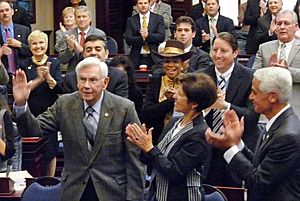
In 1994, former governor Askew was honored. He was named to the first group of the Florida DeMolay Hall of Fame.
The Reubin O'D. Askew School of Public Administration and Policy at Florida State University was named after him. This school teaches about government. From 1999 until his death, Askew taught a class there. He taught about state and local government and international trade.
For ten years before that, Askew lectured and taught at other public universities in Florida. In 1994, the Reubin O'D Askew Institute on Politics and Society was created at the University of Florida. This institute brings people together to work on state issues. Askew also lectured and took part in conferences there.
Death
Askew died at a hospital in Tallahassee on March 13, 2014. He was 85 years old. He passed away from problems related to pneumonia and a stroke.
Legacy and Honors
- Askew is seen as a very effective governor. He was named one of the "Top 50 Floridians of the 20th Century." This was for his work on "Tax reform, racial justice and honesty in government."
- The Student Life Center at Florida State University was renamed the Reubin O'D. Askew Student Life Center in his honor.
- The Florida State University Alumni Association gives an award in his name. It is called the Reubin O'D. Askew Young Alumni Award.
- The library at his high school, Pensacola High School, was also named after him.
- Interstate 110 in Pensacola is named the Reubin O'Donovan Askew Parkway.
- The main terminal at Pensacola International Airport is named the Reubin O'Donovan Askew Terminal.
He was named a Great Floridian by the Florida Department of State in 1998. This program recognizes Floridians who have greatly helped the state.
Images for kids
See also
 In Spanish: Reubin Askew para niños
In Spanish: Reubin Askew para niños
- List of University of Florida honorary degree recipients
 | Aurelia Browder |
 | Nannie Helen Burroughs |
 | Michelle Alexander |


